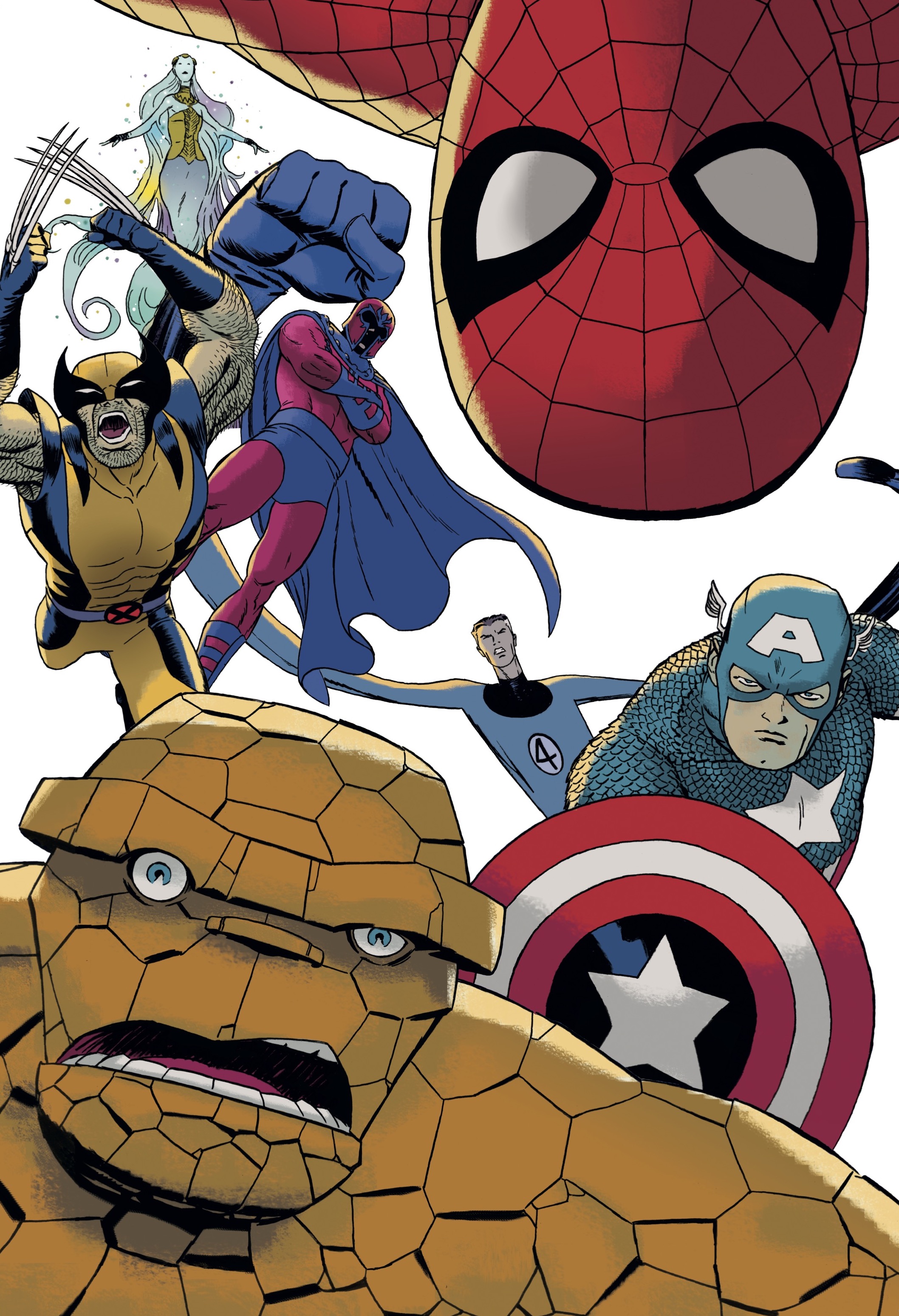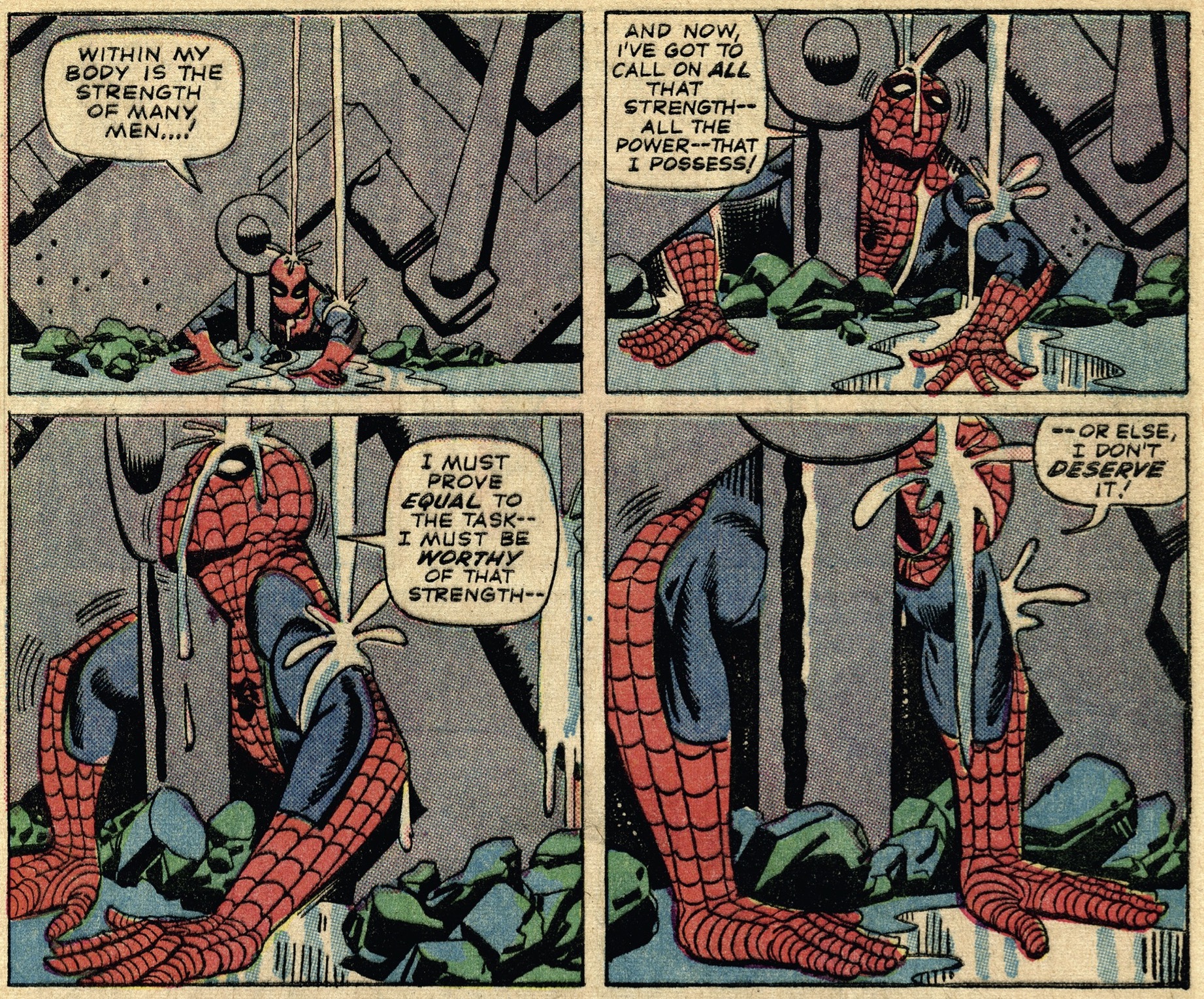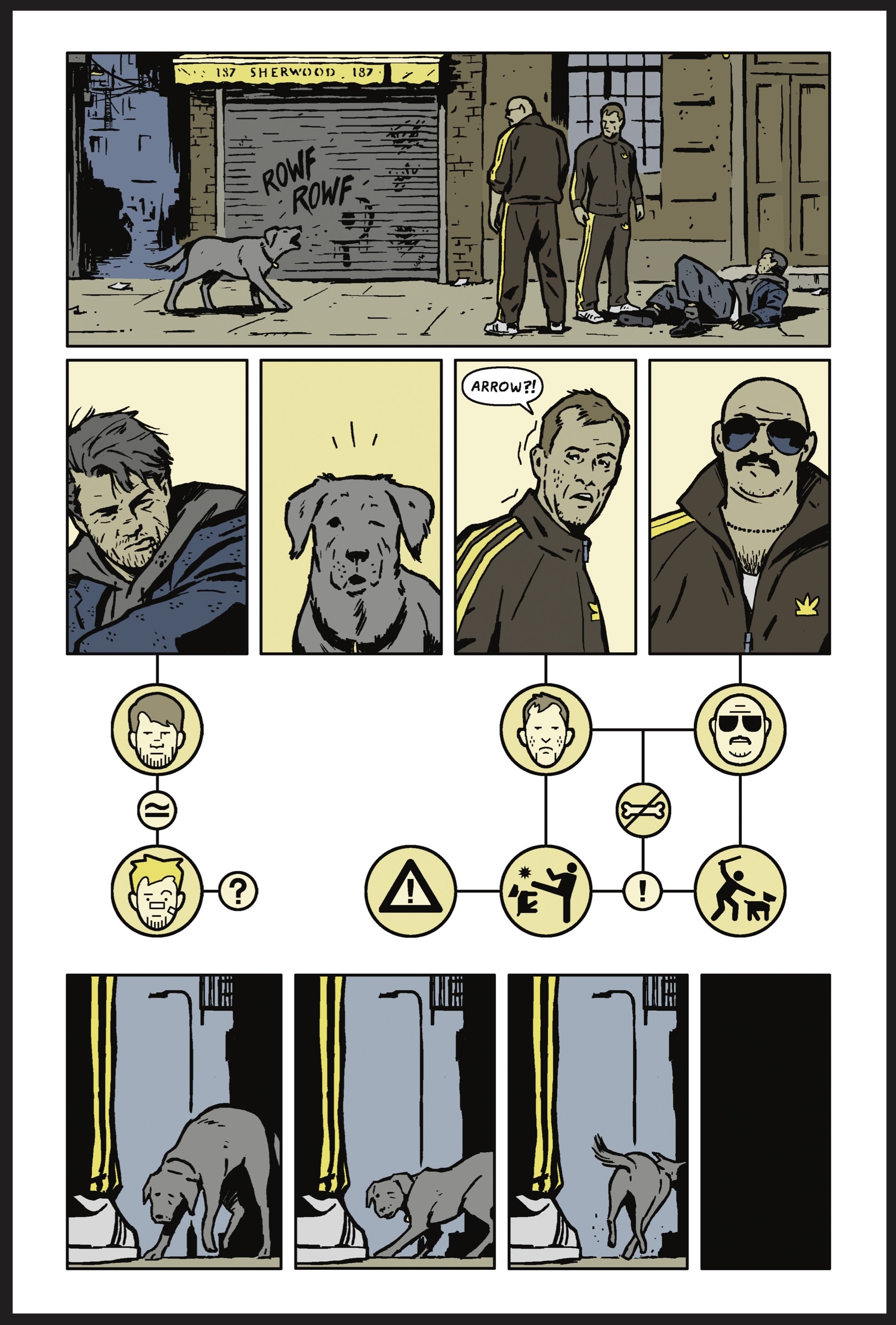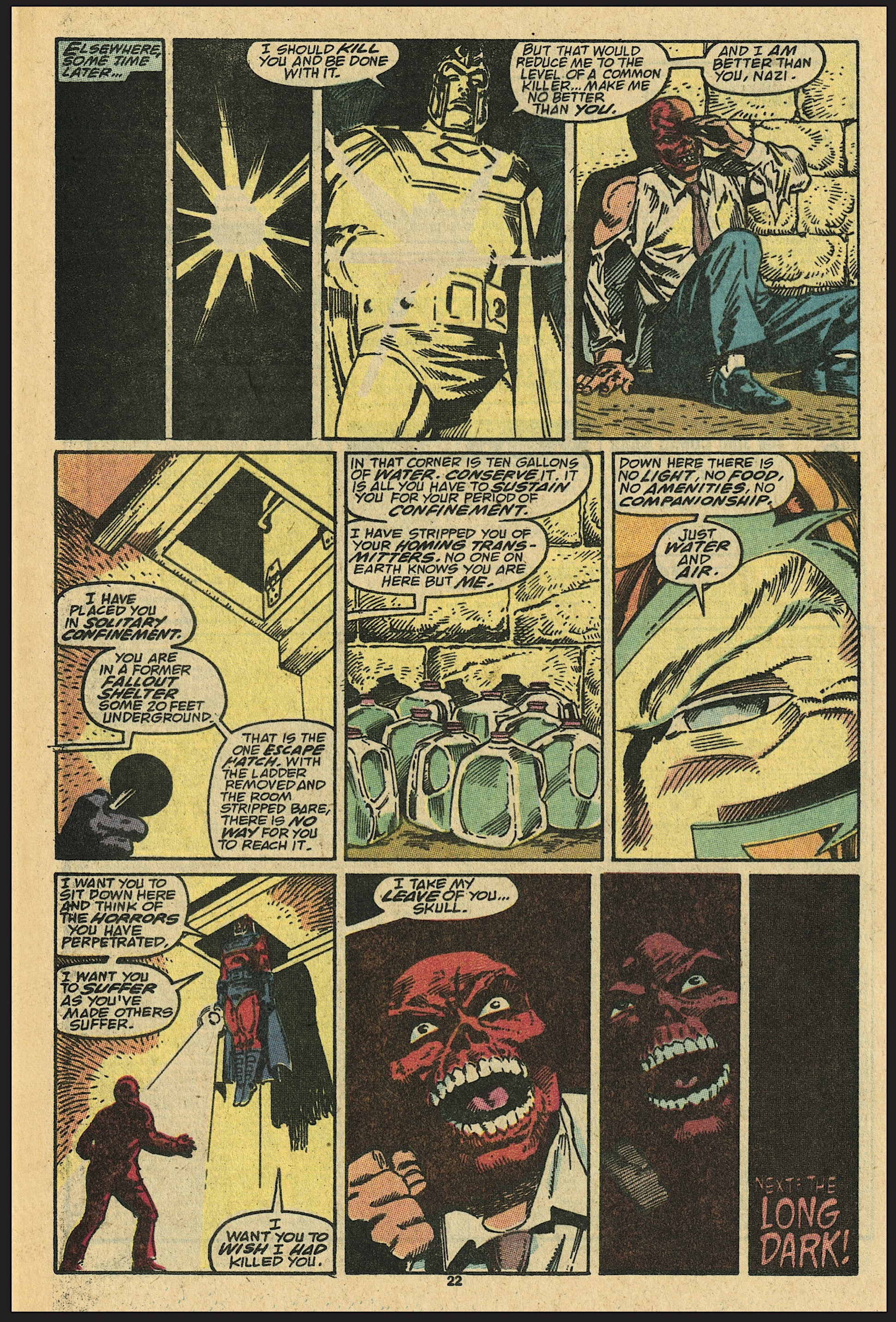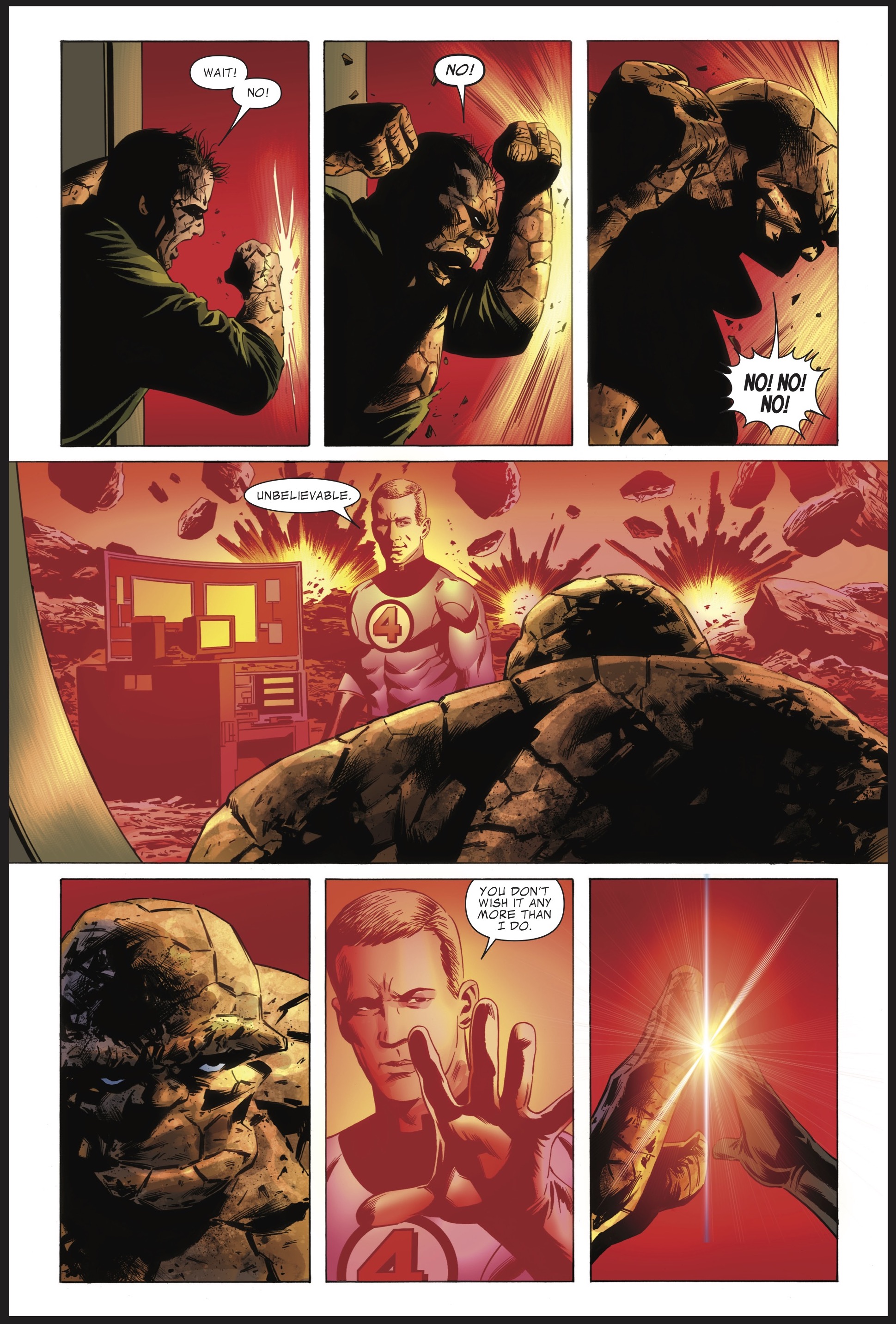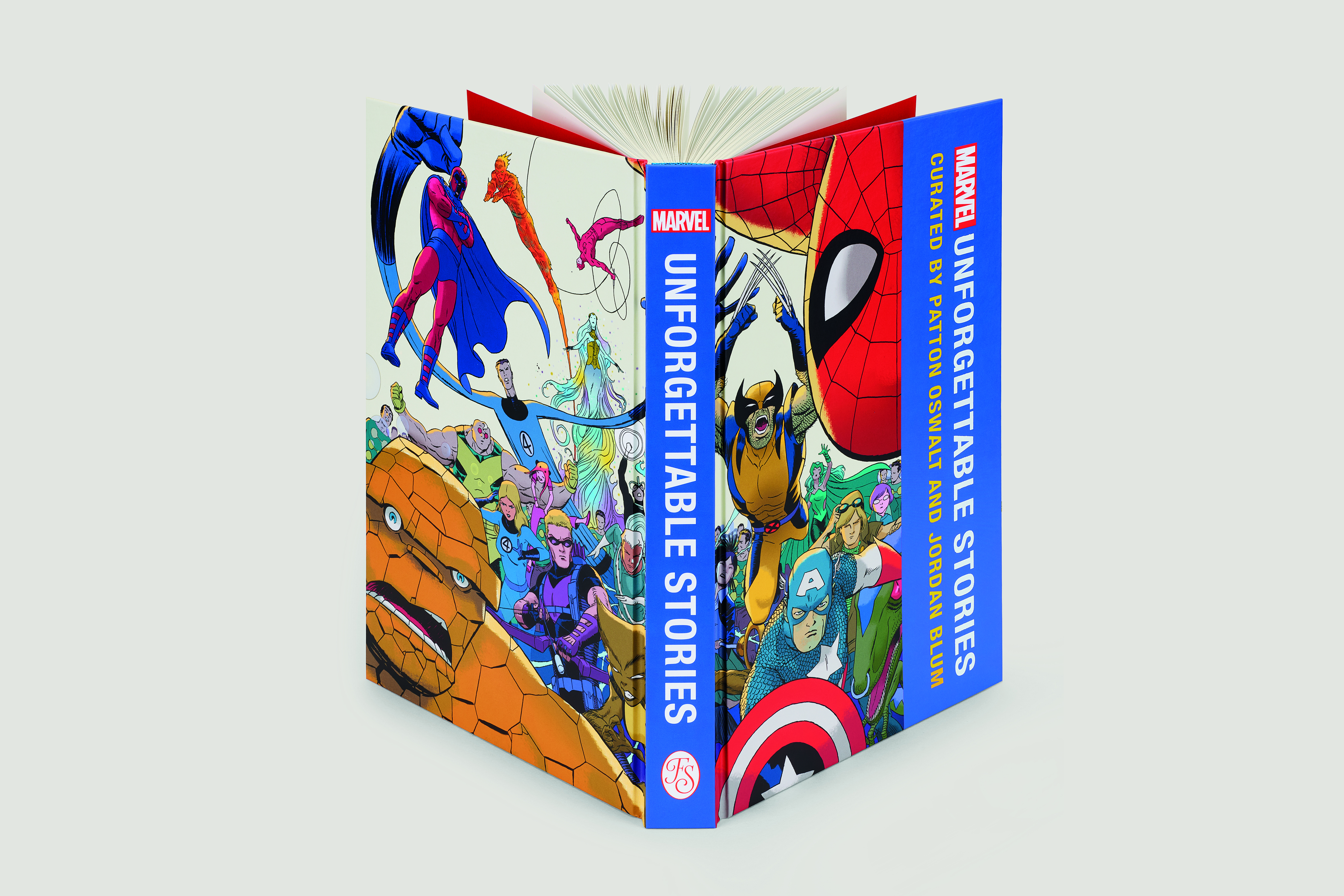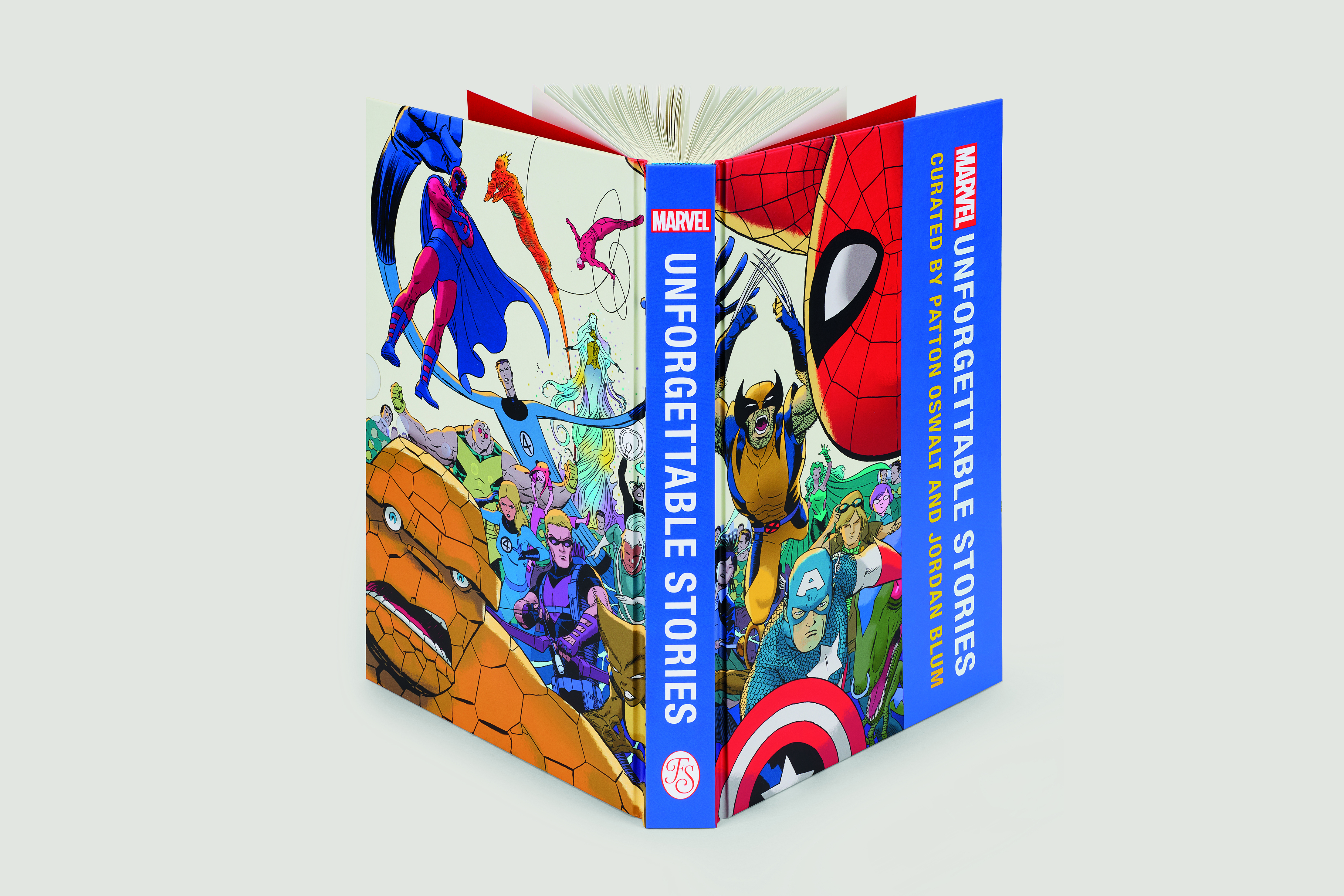The Folio Society’s Marvel Comics compilation Unforgettable Stories gives the best-of compilation a unique twist by entrusting Patton Oswalt and Jordan Blum to pitch comics fans on the individual Marvel issues that matter most. Oswalt, a comedian, actor, pop-culture writer, reigning nerd star, and Star Wars ranter, previously teamed with veteran TV writer Blum to co-create the adult animated Marvel series MODOK and the creator-owned comics series Minor Threats. It is no surprise that they have strong opinions about Marvel’s best and most important comics.
It’s easy to see why Oswalt and Blum selected the comics in Unforgettable Stories. The issues, spanning from 1966 to 2013, come from some of Marvel’s most iconic creators. Some experiment with format, like Matt Fraction and David Aja’s Hawkeye issue “Pizza Is My Business,” from the point of view of Hawkeye’s dog. Some tell watershed stories, like Stan Lee and Steve Ditko’s The Amazing Spider-Man’s “The Final Chapter!” Most of these issues provide radical, new-at-the-time perspectives on iconic Marvel heroes and villains. (See a full table of contents here.)
Still, it was difficult to choose just 10 issues, Oswalt acknowledges in his introduction. His short essay about curating the book preemptively reacts to any debate about the contents: “I can hear the bleats and rumblings of, ‘But you didn’t include…’ and ‘How could you forget…’ Lemme save your vocal cords the stress — you’re right. Any objections you have to any stories being passed over? You’re right. There’s simply too many to fit under one cover. Hey, maybe buy this edition, and get all of your friends to buy one, and they’ll let us pick ten more! Capitalism!”
Polygon sat down with Blum and Oswalt to talk about pulling together the compilation, which comics made them especially emotional, and why they’ll both keep reading month-to-month floppies as long as comics companies keep them coming.
This interview has been edited for concision and clarity.
Polygon: What kind of process did you use to assemble this specific list of comics?
Patton Oswalt: We instantly had a very, very long list, and then just had to start paring it down. We both, it turns out, have really good memories for the stories that landed with us. So it was more about killing our darlings than trying to find 10.
Jordan Blum: I’m a bit of an X-Men guy. Patton’s a bit of a Spider-Man guy. So they got a little more exposure. But we didn’t want to flood the list with just our favorite characters. We wanted to represent the Marvel Universe.
Did it ever get heated? I don’t picture you screaming at each other, but curating the essentials list of anything is a nerdy task, and nerds like us tend to have strong opinions about any all-time best list. Did either of you have to get emphatic or energized about absolutely needing a certain thing in this compilation?
Oswalt: The thing is, we’re in our 50s now. If we’d done this in our 20s, yeah, we would’ve been. But when you hit your 50s, you’re all like, Oh, there is so much out there, and no one’s really right or wrong. This is just about being totally honest about what landed with us. So it was hard for me to argue with Jordan, because he was so good at articulating — and I hope I was too — “No, this is why this is [essential].”
I had never read that Magneto vs. Red Skull issue [1990’s Captain America #367, where Magneto sets out to punish Red Skull for being a Nazi]. When Jordan brought it up, I went and read it. I was like, Oh my God! There were things I hadn’t read — no one reads everything, no one sees or hears everything. So if anything, it was a great opportunity for me to read stuff that I had missed. I’m like, Oh my God! I didn’t realize there’s even more stuff out there for me to enjoy!
Blum: I think the energy came in Patton being like, “What about ‘Severance Package’?” [2001’s Spider Man’s Tangled Web #4, where one of Kingpin’s minions has failed him, and calmly prepares for Kingpin to murder him.] And all of a sudden, everything’s firing in my brain, I’m recalling “Severance Package” — [yells, bounces, waves arms] “Yes! I forgot about this!” The excitement was in having these stories brought back into our memories. We hope the book does the same [for readers].
Spider Man’s Tangled Web could have been the whole compilation, by the way. Every story in that series was amazing. The Rhino story — one of all the villains at the bar talking, and then Norman Osborn just lays down the law at the end. Story after story of just mind-blowing stuff. So that was actually hard, picking just one out of that series.
How long was your list before you started trying to hit a final 10?
Oswalt: Oh man, it was long.
Blum: Like 25, 30 maybe? We started to pare down after that.
What was No. 11 on your list, the last thing you eliminated?
Blum: I really wanted a [Bill] Sienkiewicz/[Chris] Claremont story. It might’ve been “Slumber Party” [New Mutants #20, from 1984], where they have a sleepover and Warlock shows up. It was one of those. And we were like, “OK, there’s one too many mutant stories on this list.” [laughs]
When you were winnowing these down, how much of the conversation was about that kind of balance, in terms of making sure the overall book represented different creators or eras, as opposed to just hitting all-time favorites?
Oswalt: Oh boy, I dunno if we had a conversation so much about balance, as “How do we best represent the flow of time from the ’60s to the early teens?” So we tried to keep the mutant stuff as focused as we could.
Blum: A lot of it was very organic. We laid it out really well in a way we weren’t planning. So much of the Silver Age has been reprinted that we just picked issues we loved that we thought were obvious. Then we tried to pick comics that were very personal to us, and that maybe were a little — I wouldn’t say specifically B-sides, but stories that just weirdly ended up being maybe not the [best known].
Oswalt: We definitely wanted to give people a sense that there is this much good stuff every week, and you never know where it’s going to come from, and then you can be taken on these monthlong journeys as you follow these runs. So if that’s what happened with Runaways #1 and the Fantastic Four issue, or if they look at “Pizza’s My Business” and go, Wow, I’ve got to see this whole series! then yes, we’ve done our job.
Blum: We were conscious that these issues should be able to stand on their own in some way. Obviously that Fantastic Four comic is the end of a story, and Runaways #1 is the beginning of a series story, but a lot of the other issues chosen were amazing almost-one-and-dones. Or the Daredevil issue is a repercussion for a big story we all know. But maybe you haven’t read the epilogue. And to me, that epilogue works on its own.
Reading a batch of comics that spans this time period gives a real sense for how the language of Marvel comics has changed, from the narrate-your-feelings era of the Marvel Method to a more dialogue-driven explanatory approach to the lean simplicity of The Runaways. As comic fans, what do you make of that progression throughout this book?
Oswalt: Marvel was always trying to be cognizant of what was clearly going on in society, but I think also what was going on in comics, even on the fringes, it’s why they went and searched out people like Rick Remender and Brian Michael Bendis and a lot of these indie guys: Let’s bring in some new blood and light a fire under everybody!
So that’s why you get these newer forms of storytelling, because the people at Marvel loved comics, and were excited by the new. They weren’t like, Oh, Dan Clowes and Ivan Brunetti, what is this crap? They’re just like, Oh, wow. They’re excited to work in the form. They want people to be excited about the form.
Blum: Mark Gruenwald’s Captain America to me is the bright, colorful Marvel, and then you get something like “Pizza Is My Business,” which has such an indie spirit and is pushing boundaries of what would ever be seen in a Marvel comic. Both have equal weight and value, and I think that’s what’s really cool to showcase.
Did anything surprise you when you were either rereading old favorites or finding new favorites through each other?
Oswalt: There were Marvel comics from the ’80s — the Daredevil one, the Gruenwald one — that were very much meditating on stuff that we are dealing with now, stuff the writers were seeing bubbling beneath the surface that now has erupted. They were trying to articulate this darkness that they felt was coming, but people were like, Eh, it’s a comic book.
These guys were onto [current political issues] before the public was. We always remember Captain America’s debut was on the cover of a comic where he’s punching Adolf Hitler, before we got into the war, when a big chunk of America was like, What’s wrong with Hitler? He’s fine. [Writers Jack Kirby and Joe Simon] saw the danger before a lot of the public could. And that just continues to happen in comics.
Blum: Also, now, as a comics writer rereading Runaways, I’m like, Oh my God, that’s how you do it. That’s how you launch a series. That’s how you keep it concise and character-driven with a great hook. I think as a TV writer, everyone’s like, “Go read the pilot to Breaking Bad!” I would say as a comic writer, “Go read Runaways! This is how you set up a series.”
Oswalt: Brian K. Vaughan is the king of launching a series, though. He is the king of the first issue where on the last page, you’re like, “OH. MY. G—” Runaways. Y: The Last Man. Especially the first issue of Paper Girls. I know it’s not a Marvel comic, but that is maybe one of the best first-issue last frames for “Oh, oh no!” I love him so much.
This omnibus is very focused on single issues, which makes for that kind of cliffhanger. There’s been a lot of online musing about whether individual comics, floppies, are or aren’t selling poorly and whether they’re on the way out. Are you devoted to the single-issue experience, as opposed to waiting for collected books?
Oswalt: I got to have my weekly issues, man. It’s a really good way to teach you storytelling. How do you tell a story that will keep people hooked until the next month? Think of all the distractions we have going on [picks up his cell phone and waves it], but there are still writers who know how to do something that’s going to come out once a month and keep you going, All right, what’s the next thing? I’m waiting for it! I love it.
Blum: It’s so habitual for me! It’s how I like to consume things, in the same way that I prefer a week-to-week release of a show, as opposed to being able to binge the whole thing. But when I go back to reread an arc, I love having a really nice, clean graphic novel. That’s my preferred way to go back to certain stories.
Many of these stories were new for me, but I could clearly see how they broke the mold for comics in their different eras, how they represent new, bold storytelling choices. But “The Last Stand,” the Fantastic Four issue from 2011, seems less groundbreaking. What made that one essential for you?
Blum: The quick answer is, it made me cry when I read it. The amazing thing about that is — I have been reading comics since I was 2 years old. Characters die every month and come back. And the Fantastic Four have been around literally since the beginning of the Marvel Universe. But somehow, Jonathan Hickman gave me something that felt so fresh and unique and present that it invoked that emotional response.
I should know better. I feel like I’ve seen every Fantastic Four story a million times, but he managed to do that to me. I think that’s the magic of comics, is taking these characters and finding new ways to tell stories and evoke emotions. So that’s why it’s in there — it’s a master class in taking the old and doing something new with it.
If Marvel came back to you and said, “This book did amazing numbers, we want each of you to curate a solo book around a favorite character, but you can’t do your favorites — Jordan, you can’t do X-Men, Patton, you can’t do Spider-Man” — what would your first choice be for a follow-up?
Oswalt: I mean, we didn’t include any Hulk stories, any of the Peter David Hulks. There was some amazing stuff there. That’s one. There’s a Punisher issue called “The End,” where basically it’s the Punisher at the end of the world, and it’s so ridiculously dark that it’s almost a parody of the Punisher: Let’s take this as far as we can go. Gail Simone had some amazing runs. So there are so many other areas we could explore.
Blum: I think I would pick some really obscure stuff, like a What The—?! compilation. I haven’t read them in years, but they had such an impact on me. What The—?! is like Marvel’s Mad. Also, I was a big New Warriors guy.
Oswalt: It would be really, really cool to collect 10 comics that clearly, very visibly influenced everything afterward. There’s very specific issues of Daredevil: Born Again where I think comics just were not the same after those issues came out. Same with the first issue where Bendis redid Spider-Man. That was like, Oh, things are now different from this point on.
Blum: I would want to do one that’s like, storylines. That was the thing I kept finding to be limiting. It was like, “Well, can’t we just put all four issues of this storyline in here?” But that was counter to what we were doing. So I guess we would need an omnibus this big [holds hands 2 feet apart], but we could put in the entire Dark Phoenix saga, or something like that.
What’s the most recent comic you’ve considered this level of stone-cold classic?
Oswalt: There’s one I’m reading right now called The Power Fantasy. There’s a thing when someone kicks open a door, the way Alan Moore did with Watchmen. People kind of stand in the doorway, and then people go through. So Astro City was like, “I’m going through the portal Alan Moore opened up.” And the latest one to do that is Kieron Gillen with Power Fantasy. I don’t know how many people are reading it, but it is one of those things I think a lot of comics creators are reading, and you’re going to see some definite changes happening.
Blum: For Marvel in particular, I think we haven’t even begun to appreciate House of X and how important and next-level that was. That would be one of my first picks for new classics.
What’s the intended takeaway when somebody reads this book? What do you want them to feel or think or do next?
Oswalt: I want them to feel like, “Oh my God, there are stories like this that I missed, that I can go back and read? What is coming down the line if this is what they do on a regular basis? What’s going to be out in the coming weeks? In the coming months? In the coming years? I’ve got to pick a couple titles and follow them. I’ve got to pick a couple writers that I really love and follow them and see what they do.” Because that’s the joy of [comics fandom].
Blum: Yeah, uncover those hidden gems, then go seek out the new ones before they’re established.
